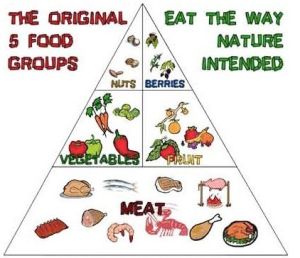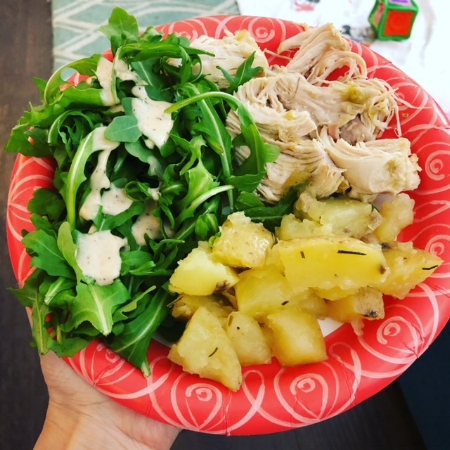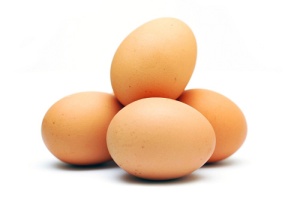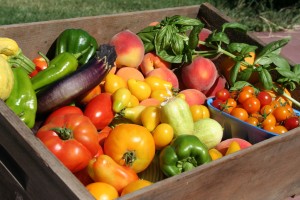Today was my first day of my new (and first) job! As I mentioned a few posts back, I am now a Nutritionist-RD at WIC, a supplemental nutrition program for parents and children to receive food and good nutrition counseling! I am beyond excited and was pretty much acting like it was Christmas morning all day long! So, in honor of my first day, I have decided to dissect a rather scientific article I read on our cruise! :) I've talked about the Paleo diet before, but will do a brief overview again before getting into the article I read. This diet may be surprising to some who have not heard about it, but be patient, do some extra research if you are interested, and learn something new! :)
The Paleo diet is one that focuses on foods that our ancestors ate before modern agriculture. This includes animal proteins (meat, chicken, fish, lamb, eggs, etc), vegetables, fruits, and healthy fat sources such as coconut, nuts, avocado, and olive oil. NO dairy, legumes, grains, soy, seed oils, or artificial sweeteners allowed. Foods like corn, oats, rice, peas, and quinoa are all considered grains, so those are omitted as well (and if you look at the nutrition composition of these foods, they are mostly carbohydrate and act as starches in your body, so they are omitted with good reason).
I am a fan of the Paleo diet (while I still do love my cheeses...just can't seem to give them up)! I did my first Whole 30 (a very strict Paleo diet for 30 days) last March-April, and it was a good experience for me and my health. However, I did suffer from the usual restriction-overconsumption syndrome that usually follows a strict diet, and proceeded to crave and include gluten in every single thing I ate for a few months. But this experience also reminded me that my reactions to gluten are not too desirable, as I was sick and experiencing symptoms I didn't feel when abstaining from gluten. After a few break ups and reunions with the G-word, we finally broke up on the cruise about a month ago. While I am still having dairy, I am otherwise following a gluten-free and mostly grain-free diet. I feel so much healthier in every aspect of the word. I now have rare, if any tummy issues, am finally sleeping through the night (something I haven't been able to do well since I was an infant), feeling more mentally alert and energetic, and enjoying clearer skin! I am also eating more plants and fruits than I ever have before in my entire life...including when I was vegetarian! I am loading my plate with dark green leafy vegetables, broccoli, carrots, kale, sweet potatoes, ANY vegetables I can find. I firmly believe that this is the key to a successful and healthy Paleo lifestyle; focusing on the whole, real, and nutritious vegetables, fruits, and healthy proteins and fats you can eat!
However, keep in mind that you don't have to stay away from these foods 100% of the time. Many Paleo enthusiasts follow an 80/20 lifestyle, keeping to the Paleo diet 80% of the time and allowing the occasional non-Paleo foods 20% of the time. Just figure out what works for you, makes you happy and healthy, and go with that!

The article I read is entitled "Beneficial effects of a Paleolithic diet on cardiovascular risk factors in type 2 diabetes: a randomized cross-over pilot study." Citation is below! :)
Jönsson, T., Granfeldt, Y., Ahrén, B., Branell, U. C., Pålsson, G., Hansson, A., ... & Lindeberg, S. (2009). Beneficial effects of a Paleolithic diet on cardiovascular risk factors in type 2 diabetes: a randomized cross-over pilot study. Cardiovasc Diabetol, 8(35), 1-14.
The goal of this research group was to determine the effects of a paleolithic diet and a typical diabetic diet as "generally recommended" on risk factors for cardiovascular (or heart) disease. The study was done on patients with type 2 diabetes who were not on insulin. The different biomarkers that were measured were HA1C (hemoglobin A1C), which is basically an average of your blood sugars for the past 3 months, blood pressure, HDL cholesterol, and triglycerides. Body measurements were kept track of as well, such as weight, BMI, and waist circumference.
Participants were placed in two, random groups and were told that they were both going to receive a "healthy diet." Each group received guidelines for either the typical diabetic diet (whole grain carbohydrates, legumes, fruits, vegetables, and high fiber foods, with a decrease in fat), or the Paleo diet (defined as I did above). The majority of the diabetic diet came from carbohydrates, while the majority of the Paleo diet came from proteins and fats, as well as carbohydrates from fruit and vegetable sources. After following their originally assigned diet for 3 months, the group switched diets and followed the alternate diet for the next 3 months.
The findings of this study may surprise some people! Results showed that the Paleo diet significantly resulted in lower HA1C, blood pressure, triglycerides, and waist circumference, and higher HDL (good cholesterol), compared to the typical, recommended diabetic diet. The Paleo diet was also naturally lower in calories, even though no guidance was given to the participants on the amount of food they should be eating. They were just told what kinds of foods they should be eating (quality) and were allowed to regulate themselves. The Paleo diet also increased insulin sensitivity, which means that the insulin was able to work more efficiently in the body, clear the blood sugars effectively, and prevent high blood sugar levels.
What got me the most excited about this study is that the HDL (protective) cholesterol and triglyceride values both improved! HDL increased while triglycerides decreased, which is a markedly improved cardiac outcome. This is huge because many opponents to the Paleo diet claim that the diet is too high in proteins and fats (both from animal sources and nuts/oils). However, this demonstrates that eating these foods does not necessarily cause us to build up cholesterol and triglycerides in our bodies. From my own personal experience, since adopting a mostly Paleo lifestyle, my cholesterol has dropped from 185-113! And I was eating at least 2 whole eggs a day, as well as meats.
Additionally, the study found that the Paleo diet led to decreases in waist circumference, proving that the Paleo diet is not going to pose a health risk on those choosing to follow this eating plan. Cardiovascular markers significantly improved, decreasing people's risk of developing heart disease. Participant's waists actually got smaller, and who doesn't want that? The fact that the diet was also self-regulated and those on Paleo naturally ate less also shows that the Paleo diet, with its combination of protein, vegetables, fruits, and healthy fats, is more filling than the typical recommended diabetic diet. I think all of these findings provide ample evidence that adopting a Paleo diet may be a beneficial decision for many people. It isn't just about the quantity of foods we are eating, which I will get into more in one of my upcoming book review posts. The quality of our food matters, and when we are eating high quality, whole, unprocessed foods, our bodies will thank us and start functioning the way they were intended to function!
I hope this post provided some information on the Paleo diet and the possible benefits of following this lifestyle. There is a plethora of information on this internet of ours to help guide you. Again, the best way to find out what lifestyle works for you is to try it and see! It is important to follow a plan that is beneficial, but is also doable and realistic for you. I am also planning on writing a few book review posts in the next few weeks highlighting some books that also support the idea of eating wholesome unprocessed foods for better health!
Have a great night everyone! This girl's gotta pack her lunch for work tomorrow! :)











